Louth, Lincolnshire
| Louth | |
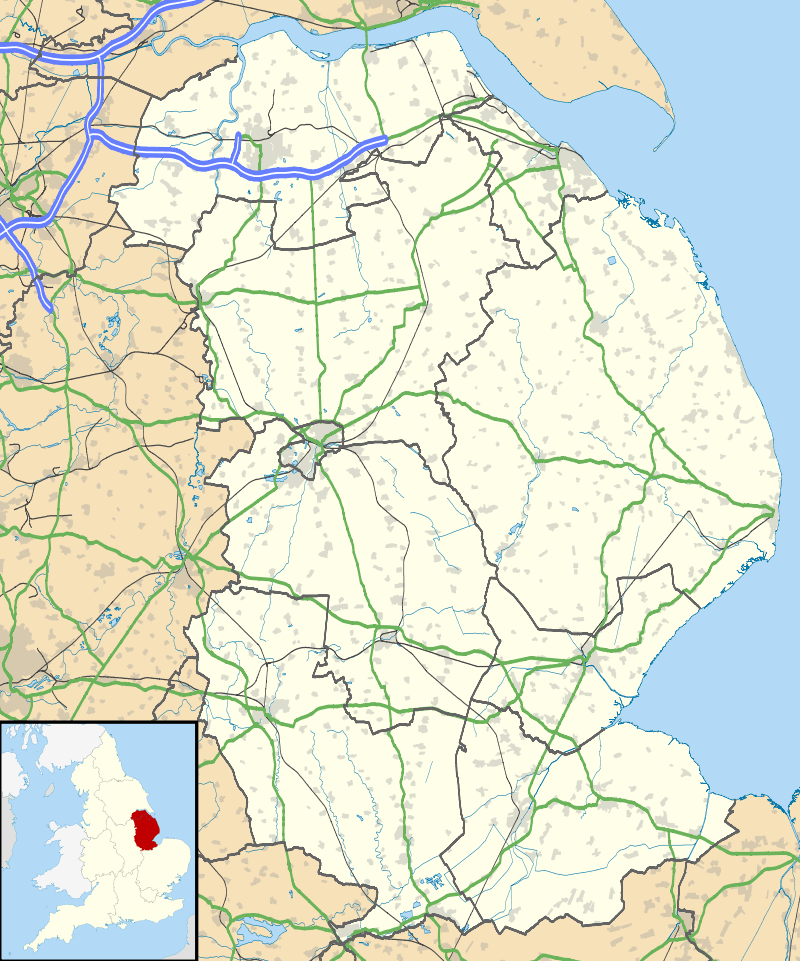 Louth |
|
| Population | 16,419 (2011) |
|---|---|
| OS grid reference | TF326874 |
| – London | 130 mi (210 km) S |
| Civil parish | Louth |
| District | East Lindsey |
| Shire county | Lincolnshire |
| Region | East Midlands |
| Country | England |
| Sovereign state | United Kingdom |
| Post town | LOUTH |
| Postcode district | LN11 |
| Dialling code | 01507 |
| Police | Lincolnshire |
| Fire | Lincolnshire |
| Ambulance | East Midlands |
| EU Parliament | East Midlands |
| UK Parliament | Louth and Horncastle |
|
|
Coordinates: 53°22′01″N 0°00′22″W / 53.3669°N 0.0061°W
Louth ![]() i/ˈlaʊθ/ (locally /laʊɛθ/) is a market town and civil parish in the East Lindsey district of Lincolnshire, England.[1]
i/ˈlaʊθ/ (locally /laʊɛθ/) is a market town and civil parish in the East Lindsey district of Lincolnshire, England.[1]
Geography
Louth is at the foot of the Lincolnshire Wolds where they meet the Lincolnshire Marsh and is known as the Capital of the Lincolnshire Wolds. It developed where the ancient trackway along the Wolds, known as the Barton Street, crossed the River Lud. The town is east of a gorge carved into the Wolds that forms the Hubbard's Hills. This area was formed from a glacial overspill channel in the last glacial period. The River Lud meanders through the gorge before entering the town.
Louth has a population of 15,930.[2]
The Greenwich Meridian passes through the town and is marked on Eastgate with a plaque on the north side of the street, just east of the junction with Northgate. The three-mile (5 km) £6.6 million A16 Louth Bypass opened in 1991. The former route through the town is now designated as the B1520.
History
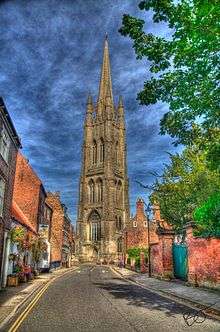
Three handaxes have been found on the wolds surrounding Louth, dating from between 424,000 and 191,000 years ago, indicating inhabitation in Paleolithic era.[3] Bronze Age archeological finds include a 'barbed and tanged' arrowhead found in the grounds of Monks' Dyke Tennyson College.[4]
St Helen's Spring, at the Gatherums, off Aswell Street, is dedicated to a popular medieval saint, the mother of Constantine the Great, the first Roman Emperor to become a Christian,[5] but is thought to be a Christianised Romano-British site for veneration of the pagan water-goddess Alauna.[6]
The Anglo-Saxon pagan burial ground, northwest of Louth, dates from the fifth to sixth centuries, and was first excavated in 1946.[5] With an estimated 1200 urn burials it is one of the largest Anglo-Saxon cremation cemeteries in England.[7]
Æthelhard, a Bishop of Winchester who was made Archbishop of Canterbury in 793, was an abbot of Louth in his early life.[8]
Louth is listed in the 1086 Domesday Book as a town of 124 households.[9]
Louth Park Abbey was founded in 1139 by the Bishop Alexander of Lincoln as a daughter-house of the Cistercian Fountains Abbey in Yorkshire.[10] Following its dissolution in 1536 it fell into ruin and, today, only earthworks survive, on private land, between Louth and Keddington.[11][12] Monks' Dyke, now a ditch, was originally dug to supply the abbey with water from the springs of Ashwell and St. Helen's at Louth.[13]
In 1643, Sir Charles Bolles, a resident of Louth, raised a 'hastily-got-up soldiery' for the Royalist cause in the English Civil War. Fighting took place in, and around the town and, at one point, Bolles was forced to take refuge under the Ramsgate bridge.[14] By the battle's end 'Three strangers, being souldgeres, was slain at a skirmish at Lowth, and was buryed'.[14] Human remains, found during archaeological visits to Louth Park Abbey during the 1800s, in 'a little space surrounded by a ditch', were believed to date from the Civil War as two cannonballs, from that era, were found with the bodies.[15]
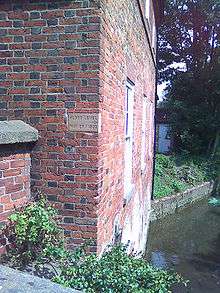
A flood occurred in the town on 29 May 1920, causing 23 deaths. One woman climbed a chimney to survive, another was the only survivor from a row of twelve terrace houses, which were destroyed by the flood waters.[17] Four stone plaques exist in the town to show how high the water level reached. Other, less devastating floods occurred on 25 June and 20 July in 2007.
Margaret Wintringham succeeded her dead husband at the Louth by-election in September 1921, to become the Liberals' first female MP, and Britain's third female MP.
St Herefrith of Louth
St Herefrith,[18] or Herefrid, is Louth's 'forgotten saint',[19] whose feast day is 27 February.[20] He was a bishop, who died around 873, possibly killed by the Danes.[21] An 11th-century text describes Herefrith as Bishop of Lincoln, but as the bishopric there dates to 1072, Lincoln more probably refers to Lindsey,[22] the early name for Lincolnshire.[21] Similar confusion exists in an inventory of Louth's St. James Church, written in 1486 and transcribed in 1512, where he is referred to as a Bishop of Auxerre, France.[23]
At some point, following his death, a shrine venerating him was established at Louth. Æthelwold, the Bishop of Winchester from 963 to 984, was actively seeking relics for his newly rebuilt Thorney Abbey in Cambridgeshire and sent his monks to Louth to raid Herefrith's shrine.[22] From an 11th-century account, Æthelwold had:
...heard of the merits of the blessed Herefrid bishop of Lincoln resting in Louth a chief town of the same church. When all those dwelling there had been put to sleep by a cunning ruse, a trusty servant took him out of the ground, wrapped him in fine line cloth, and with all his fellows rejoicing brought him to the monastery of Thorney and re-interred him.[22]
A church dedicated to St. Herefrith, at Louth, appears in accounts from the 13th to 15th centuries,[21] and one of his relics, an ivory comb, is recorded among the possessions of Louth's St. James Church in 1486.[23] Suggestions that the shrine, and later church, of St. Herefrith, were earlier incarnations of St. James has 'no supportive evidence' but St James' is the site of two earlier churches of which little is known.[24]
St James' Church
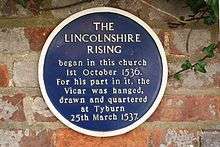
The town was the origin of the Lincolnshire Rising, which started on 1 October 1536 in St James Church. The rising began after Rev. Thomas Kendall, the incumbent, gave an 'emotive sermon',[25] the evening before the King's Commissioners were due to arrive and assess the church's wealth.[26] Some of the townspeople, fearful that the church treasury would be seized by the men of the Crown, demanded the building's keys.[25] The townspeople kept vigil that night, and, the following day, rang the church bells, 'an ancient call to rebellion', to gather a crowd.[26] Having begun marching from Louth, 50,000 supporters converged to camp at Hembleton Hill, the following evening, before they continued to Lincoln to confront the King's Commissioners.
The town's skyline is dominated by St James' Church, Louth, the spire of which is 295 feet (90 m) tall. Though shorter than both Norwich Cathedral 315 feet (96 m), and Salisbury Cathedral 404 feet (123 m), in terms of spire height it is the tallest Anglican parish church in the United Kingdom. The building of the spire commenced in 1501 and was finally completed in 1515.
In 2015 came a remarkable discovery from the adjoining Rectory garden in the form of two pieces of a pre-Conquest standing stone Cross dating to c950. In form the Cross is of the 'ring' or 'wheel head' type, the central design being of Christ crucified. The type is more commonly seen today in Ireland. The Cross and its implications for the archaeology, history and the early church in Louth will be the subject of a major article by Everson and Stocker in the Medieval Archaeology Journal in November 2016.[27]
Landmarks and Places of Interest
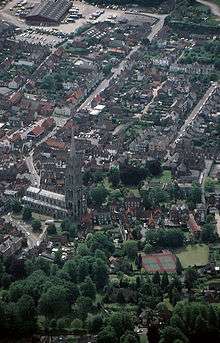
Louth Museum has a Panorama Gallery, which features two back-lit replicas of William Brown's Panorama of Louth viewed from the top of St James' spire in 1844. The two original paintings that together form the panorama hang side-by-side in the Council Chamber of the Town Hall on Little Eastgate. The panorama gives a unique and vivid representation of the streets, businesses, homes and people of the town and the landscape as far as the North Sea to the east and northwards to the Humber estuary and beyond.[28]
Much of the town centre is lined with brick buildings from the 17th and 18th centuries.
ABM Pauls used to have a large maltings which was the first of its kind built in Europe to an American design out of reinforced concrete in 1949. The site had been the location of a maltings since 1870 which was destroyed by German bombs in 1940, and had to be built on the old site to qualify for war compensation.[29] At its height the maltings processed 50,000 tonnes of barley per year, with exports handled through the nearby port of Immingham. The maltings closed in 1998 and the 120 feet (37 m) tall structure was left derelict for many years. The German supermarket chain Aldi was granted permission to build a new store on the site, and it was demolished in 2014/15.[30]
Hubbard's Hills is one of the town's main attractions. It was opened to the public in 1907. The park is dedicated to the memory of Annie Pahud, the central figure of a historic, tragic love affair. The park is situated in a glacial overspill channel that forged the course for a small river, the Lud. It meanders along the deep, flat valley bottom between steep, wooded slopes on either side.
The Belmont television and radio mast, once one of the tallest structures in the European Union (until its height was reduced in 2010), is situated in the nearby village of Donington on Bain, 5 miles (8 km) west of the town.
Louth will be the eventual southern terminus of the Lincolnshire Wolds Railway, based at nearby Ludborough. The town was formerly on the East Lincolnshire Railway from Peterborough to Grimsby, an important north-south route especially for holidaymakers in the summer. It opened in 1848. The line to Mablethorpe started in the town from 1877, closing in 1960. The section to Wainfleet closed in 1961, with the Louth to Grimsby section later continuing for passengers until October 1970, with freight stopping in 1980. The former station is now residential flats; there are other reminders still standing.
Alfred Lord Tennyson was educated at King Edward VI Grammar School. A stone inscription to commemorate this forms part of a wall on Schoolhouse Lane in Louth.
Shopping and local economy
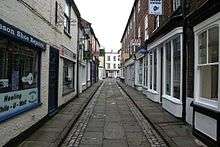
Louth is noted for the wide selection of independent retailers, with around 70% of businesses independently owned.[31] In 2012, it was named 'Britain's Favourite market town' by the BBC's Countryfile.[32]
The town's long retail history is represented by a number of longstanding businesses, including the department store Eve and Ranshaw, whose history can be traced back to 1781,[33] Dales & Sons, poulterers since 1896,[34] and the century old butchers, Lakings of Louth.[34]
The first building society branch office was opened by the Peterborough Building Society (now Norwich & Peterborough) in 1973. The town was also the headquarters of the former Louth, Mablethorpe and Sutton Building Society, a local society with several branches and agents in Lincolnshire, which was taken over by the Bradford & Bingley in 1990.[35]
Louth is also known for its specialist grocers,[34] and local butchers, Meridian Meats, have won numerous awards.[36] It is also home to The Cheese Shop, which has gained nationwide recognition, including in The Daily Telegraph,[37] The Guardian,[38] and on The Hairy Bikers' Food Tour of Britain.[39]
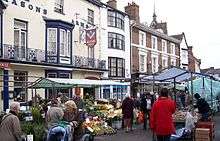
Louth holds market days on Wednesdays, Fridays and Saturdays. There is a farmers' market on the fourth Wednesday of each month. A cattle market is held each Thursday at the Louth Livestock Centre on Newmarket.
There is a small Morrisons, formerly a Somerfield store,[40] which opened in 1985, and a Co-operative supermarket, which opened in 1989. The Co-op was given approval for an additional smaller store in 2013.[41]
Louth 'has fought hard' to retain an independent retail focus.[42] In 2008, a local pressure group, Keep Louth Special, was formed by residents, shoppers and business owners, to lobby against a proposal for a major supermarket on the former cattle market site.[43] The group was criticised by a town councillor, the following year, as 'outsiders' who wanted to live in a 'museum town',[44] but a 2012 council report, while recommending a 'large retail development' as ‘necessary’, acknowledged that 'a majority 50 per cent' of surveyed residents opposed it.[45] An initial 2009 planning application by Sainsbury's for a new 30,000 square feet (2,800 m2) store,[46] was rejected by the Council, after appeal, in 2012.[47] Keep Louth Local described a 2013 proposal for an Aldi store as 'not bad news' because it was intended for an 'eyesore' site,[48] and as Aldi stocks 'own brands and a limited fresh-food offering', it would not be 'going head-to-head' with the town market or independent retailers.[49]
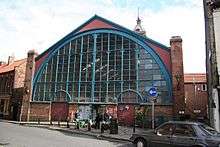
Many national food campaigning organisations are based on Eastgate under the umbrella organisation the Processed Vegetable Growers Association, notably:
- The Asparagus Growers Association
- The British Onion Producers Association
- The British Herb Trade Association
- The Brassica Growers Association
- The Leek Growers Association
- The Radish Growers Association
- The Turfgrass Association
Community and culture
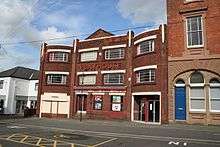
The town's Playhouse Cinema is on Cannon Street, and is home to Louth Film Club, which won the British Federation of Film Societies' Film Society of the Year Award in 2008.[50] Louth Playgoers Society's Riverhead Theatre is on Victoria Road, to the east of the town.
There are several local bands, especially jazz, in and around the town. Corinne Drewery of Swing Out Sister, grew up in the area and Robert Wyatt is a resident.
Transition Town Louth is a community project, which organizes various events in and around the town aimed at promoting awareness of climate change and unsustainable resources. Part of a large social movement, many Transition Towns are now developing. A sub-group, the Community Food Gardens are encouraging a shift towards sustainable communities.
Sport and leisure
Meridian Leisure Centre
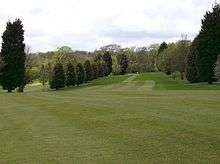
The Centre opened on 6 February 2010, and, by 2013, had received almost one million visits, and was home to over 20 clubs.[51] It cost £12 million and consists of an 8 lane, 25 metre swimming pool and a two level gym with over 80 pieces of equipment, along with a sports hall and other facilities. The Louth Technology Hub, which is using 3D display technology, with a focus on sports groups and clubs, opened on the Centre's upper floor in October 2013.[52]
Louth Tennis Centre
Louth Tennis Centre is situated on Fairfield Industrial Estate to the north of the town and has indoor and outdoor tennis facilities.
London Road Sports Pavilion
There is a multiuse sports pavilion on London Road, which includes football pitches, a cricket pitch and a multi-use astroturf pitch.
Cricket
Louth Cricket Club was formed in 1822 and play their home games at the London Road sports pavilion
Football
Louth is home to Louth Town Football Club which plays in the Lincolnshire Football League.
Cadwell Park
In the Wolds to the south-west of the town, around four miles (6 km) away, is Cadwell Park motor racing circuit between the villages of Scamblesby and Tathwell.
Other Pursuits
Louth also hosts Louth Swimming Club, Louth Old Boys (Football), Yom Chi Taekwondo, Kendojo Martial Arts, Louth Storm Basketball, Louth Chess Club, Louth Golf Course (Crowtree Lane) and Kenwick Park Golf Course (on the outskirts of the town) as well as Archery and a model aircraft club which uses Strubby and Manby Airfields.
Education
Primary schools
- Kidgate Primary School
- Lacey Gardens Junior School
- St. Michael's C of E Primary School
- Eastfield Infants and Nursery School
Secondary schools
Further education
A new £3 million further education college, called Wolds College, was built next to the Cordeaux School. Construction by the Lindum Group started in November 2007, and the college officially opened in October 2008. Unlike many Lincolnshire secondary modern schools, both Cordeaux and Monks' Dyke have their own sixth forms; East Lindsey's only other secondary modern with a sixth form is at Skegness. Although the town is well served for A-level provision, vocational courses were less well served until the college opened in this part of East Lindsey in September 2008, although there is the Grimsby Institute some fifteen miles (24 km) away.
Twin town
Louth's twin town is La Ferté-Bernard, close to Le Mans in Pays-de-la-Loire, France. ![]()
Ludensians
Inhabitants of Louth are known as Ludensians, taken from the Latin name of the town (Lude, Luda).
- Jeffrey Archer was elected the town's Member of Parliament in a by-election in 1969. He stood down at the October 1974 general election.
- Jim Broadbent, actor, lives in a small village just outside Louth.
- Bridget Brophy writer, lived in Louth for many years.
- Roy 'Chubby' Brown, adult comedian, (real name Royston Vasey) lives in nearby Fulstow.
- Leanda Cave, triathlete, was born in Louth
- Julie Christie, actress, has a home in Louth, and sometimes works with the local Film Club..
- Daniel Craig, actor noted for his role as James Bond has a house between Legbourne and Louth.
- George Davenport, Anglo/American frontiersman, US Army officer, was born in Louth
- Barbara Dickson, singer and actress, lives in Louth
- Corinne Drewery, lead singer of the band Swing Out Sister, attended schools in the town whilst growing up in the village of Authorpe, between Louth and Alford.
- Robert Etty, noted poet and writer, lives just outside Louth and worked in Louth most of his life.
- Graham Fellows, also known as John Shuttleworth and Jilted John, a singer-songwriter and comedian lives in the town.
- Michael Foale, the British astronaut, and captain of the International Space Station was born at Crowtree Lane Hospital (now the Humanities block of King Edward VI Grammar School) and grew up in the town (his father was stationed at the nearby Royal Air Force base at Manby).
- Dave Formula, member of New Wave pioneers Magazine, lives in Louth and often plays locally with other band The Finks.
- James Gillick Figurative artist, works from his studio in Louth and lives nearby.
- Ron Grant (motorcyclist), former motorcycle road racer and tuner.
- Dan Haigh, bass guitarist in rock band Fightstar, born in Grimsby, was brought up near the town.
- Simon Hanson, drummer with the band Squeeze lived in Louth and attended King Edward VI school.
- Augustus Charles Hobart-Hampden, (1 April 1822 – 19 June 1886), English naval captain and Turkish admiral, was educated at King Edward VI Grammar School.
- Andreas Kalvos (1792 – 3 November 1869), one of the greatest Greek writers of the 19th century, lived in Louth from 1852 until his death.
- Rev. Thomas Kendall, incumbent of St. James Church, Louth and leader of Lincolnshire Rising, 1 October 1536.
- Cate Kennedy, author
- Thomas Louth, Lord Chief Justice of Ireland in the 1330s, was born in the town and took his surname from it.
- Matthew Macfadyen, actor, spent his childhood in the town.
- Harry Mallett, cricketer, was born in Louth.
- Patrick Mower, actor, currently seen in TV soap-opera Emmerdale lives in the area in Little Carlton.
- Philip Norton, Baron Norton of Louth (born 5 March 1951), leading expert on the British Parliament, Conservative politician, author and Professor of Politics at the University of Hull
- Jim Payne, professional golfer who won two European Tour tournaments.
- Duncan Redmonds, of ledgendary punk band Snuff, is from Louth.
- Adrian Royle, retired long distance runner, lives in Louth.
- Ted Savage, footballer, was born in Louth.
- Captain John Smith, English, soldier, sailor and founder of the Commonwealth of Virginia, although born in Willoughby, attended the King Edward VI Grammar School, where his name is adorned upon a tablet in the school's 'Edward Street Hall'. A cast iron bust of him also stands within the school's canteen.
- Stuart Storey – BBC sports commentator.[53]
- Alfred Lord Tennyson was born in Somersby, between Louth and Horncastle, and was educated at King Edward VI Grammar School.
- Lieutenant Colonel Thomas Watson VC, also educated at the King Edward VI Grammar[54]
- Graham Winteringham, architect, was born in Louth.
- Margaret Wintringham, first English woman to sit as an M.P. lived most of her life just outside the town at Little Grimsby Hall, and was elected M.P. for Louth in 1920.
- Robert Wyatt, English musician and former member of Soft Machine, now lives in Louth.
References
- ↑ OS Explorer map 283:Louth and Mablethorpe: (1:25 000): ISBN 978 0319238240
- ↑ Office for National Statistics : Census 2001 : Parish Headcounts : East Lindsey Retrieved 18 September 2009
- ↑ Tom Green (2011). The Origins of Louth: Archaeology and History in East Lincolnshire 400,000 BC-AD 1086. Tom Green. pp. 4–7. ISBN 978-0-9570336-0-3.
- ↑ Tom Green (2011). The Origins of Louth: Archaeology and History in East Lincolnshire 400,000 BC-AD 1086. Tom Green. p. 33. ISBN 978-0-9570336-0-3.
- 1 2 "Historical Significance". Gatherums and Springside. Retrieved 9 November 2013.
- ↑ Tom Green (2011). The Origins of Louth: Archaeology and History in East Lincolnshire 400,000 BC-AD 1086. Tom Green. pp. 52–53. ISBN 978-0-9570336-0-3.
- ↑ Tom Green (2011). The Origins of Louth: Archaeology and History in East Lincolnshire 400,000 BC-AD 1086. Tom Green. p. 68. ISBN 978-0-9570336-0-3.
- ↑ Williams "Æthelheard (d. 805)" Oxford Dictionary of National Biography
- ↑ "Louth". Open Domesday. Retrieved 9 November 2013.
- ↑ David M. Smith, ‘Alexander (d. 1148)’, Oxford Dictionary of National Biography, Oxford University Press, 2004.
- ↑ Historic England. "Louth Abbey (354511)". PastScape. Retrieved 13 November 2013.
- ↑ "Cistercian Abbeys: LOUTH PARK". The Cistercian In Yorkshire. Retrieved 13 November 2013.
- ↑ Historic England. "Monks Dyke (354511)". PastScape. Retrieved 13 November 2013.
- 1 2 Robert Slater BAYLEY (1834). Notitiæ Ludæ, Or Notices of Louth. [By Robert S. Bayley. With Plates.]. The Author. pp. 77–78.
- ↑ Trollope, Edward (1873). "The Architectural remains of Louth Park Abbey". Reports and papers of the architectural and archaeological societies of the counties of Lincoln and Northampton. Lincoln: James Williamson. Retrieved 12 November 2013.
- ↑ http://www.louthleader.co.uk/news/local/planning-enforcement-to-investigate-bridge-street-flood-marker-1-6864366
- ↑ "A CLOUDBURST.". The West Australian. Perth: National Library of Australia. 1 June 1920. p. 7. Retrieved 12 November 2013.
- ↑ "Herefrith 10". Prosopography of Anglo-Saxon England.
- ↑ "The forgotten Saint of Louth is remembered". This Is Lincolnshire. 2 November 2011. Retrieved 12 November 2013.
- ↑ "ANNIVERSARIES". The Independent. 27 February 1995. Retrieved 12 November 2013.
- 1 2 3 David Farmer (14 April 2011). The Oxford Dictionary of Saints, Fifth Edition Revised. Oxford University Press. p. 209. ISBN 978-0-19-959660-7.
- 1 2 3 Tom Green (2011). The Origins of Louth: Archaeology and History in East Lincolnshire 400,000 BC-AD 1086. Tom Green. pp. 82–85. ISBN 978-0-9570336-0-3.
- 1 2 Peacock, Edward (1873). "Louth in the time of Henry VIII". Reports and papers of the architectural and archaeological societies of the counties of Lincoln and Northampton. Lincoln: James Williamson. Retrieved 12 November 2013.
- ↑ "St James' Church, Louth". Lincs To The Past. Retrieved 12 November 2013.
- 1 2 Anthony Fletcher; John Stevenson (4 June 1987). Order and Disorder in Early Modern England. Cambridge University Press. p. 71. ISBN 978-0-521-34932-1.
- 1 2 Linda Porter (10 March 2010). Katherine the Queen. Pan Macmillan UK. p. 60. ISBN 978-1-74303-570-2.
- ↑ http://www.bbc.co.uk/news/uk-england-lincolnshire-36070551
- ↑ "Louth Museum". Retrieved 23 September 2009.
- ↑ "American design made Louth malt kiln unique". Louth Leader. 26 March 2003. Retrieved 16 July 2015.
- ↑ "New Aldi supermarket in Louth will be chain's biggest in country". Grimsby Telegraph. 17 January 2015. Retrieved 16 July 2015.
- ↑ Burton, Melanie. "Luscious Louth". Lincolnshire Life. Retrieved 9 November 2013.
- ↑ "Countryfile Magazine Awards: The results 2012". CountryFile. Countryfile. Retrieved 9 November 2013.
- ↑ "Adam Eve and Louth Carpets". Lincolnshire Life. Retrieved 9 November 2013.
- 1 2 3 Prince, Rose (30 June 2007). "Shop Local: Louth". The Telegraph. Retrieved 9 November 2013.
- ↑ "Building society mergers and conversions since 1980". Building Societies Association. Retrieved 9 November 2013.
- ↑ "Louth butcher wins gold award at international food contest". Grimsby Telegraph. 9 April 2013. Retrieved 9 November 2013.
- ↑ Davies, Paul; "Small wonders: the winners of our Best Small Shops in Britain Awards"; The Telegraph, 11 February 2011. Retrieved 3 May 2012
- ↑ Cook, William; "Keeping it real"; Guardian.co.uk, 15 October 2010. Retrieved 3 May 2012
- ↑ "PHOTO: Hairy Bikers film new TV show in Louth – Local". Louth Leader. March 2009. Retrieved 11 March 2011.
- ↑ "Jobs could be cut at Louth's Morrisons supermarket". Louth Leader. 10 April 2013. Retrieved 9 November 2013.
- ↑ Kinnaird, Sam (31 May 2013). "Councillor left frustrated as planning inspector gives go ahead for new Co-op supermarket in Louth". Louth Leader. Retrieved 9 November 2013.
- ↑ "A town called courage: Shopkeeper, retired bobby, teacher, passers-by...". The Daily Mail. 3 September 2013. Retrieved 9 November 2013.
- ↑ "Keep Louth Special group formed to stop supermarket". Louth Leader. 28 November 2008. Retrieved 9 November 2013.
- ↑ "Keep Louth Special group blasted". Louth Leader. 9 February 2009. Retrieved 9 November 2013.
- ↑ Kinnaird, Sam (29 November 2012). "Food store development could kill small Louth shops". Louth Leader. Retrieved 9 November 2013.
- ↑ "Sainsbury's arrival 'do or die' for town". Grimsby Telegraph. 10 July 2009. Retrieved 9 November 2013.
- ↑ "Sainsbury's store plan for Louth thrown out by councillors". This Is Lincolnshire. 4 July 2012. Retrieved 9 November 2013.
- ↑ "Keep Louth Special says Aldi plans 'not bad news'". BBC. 12 July 2013. Retrieved 9 November 2013.
- ↑ "Louth Aldi store proposal is scrutinised". Grimsby Telegraph. 2 August 2013. Retrieved 9 November 2013.
- ↑ "Film Society of the Year Awards 2008". Retrieved 15 November 2009.
- ↑ "Meridian Leisure Centre nears one million visits". Louth Leader. 29 January 2013. Retrieved 9 November 2013.
- ↑ "Technology hub opening in Louth this month". On Lincolnshire. Retrieved 9 November 2013.
- ↑ Stuart Storey
- ↑ "Victoria Cross and medals from Lincolnshire hero to be auctioned". Lincolnshire Echo. 4 December 2014.
External links
 Media related to Louth, Lincolnshire at Wikimedia Commons
Media related to Louth, Lincolnshire at Wikimedia Commons
| Wikivoyage has a travel guide for Louth. |
- Louth Town Partnership
- Louth official website
- Louth Leader
- Louth Museum
- Transition Town Louth
- St. James' Church
- Hubbard's Hills
- Louth Town Council
- Louth Navigation Trust
- Louth Directory
- Shopping in Louth
- Poacher Country
- Louth eye
- Louth Choral Society
- Louth Film Club
- Louth Town FC
- Louth Community Food Gardens
- Lincs FM – Local commercial radio station